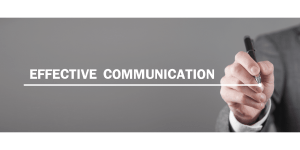Verbal communication is an essential aspect of human interaction. It involves the use of words to convey messages and ideas between individuals. There are many different forms of verbal communication, including oral communication, speech, conversation, dialogue, interviews, public speaking, debating, and voice modulation.
Each of these forms of communication has its unique characteristics and requires different skills to master. In this article, we will explore the different types of verbal communication and provide tips on how to improve your skills in each area. Whether you are a student, a professional, or simply someone looking to improve your communication skills, this post will provide valuable insights into the world of verbal communication.
Oral Communication

Oral communication is a vital aspect of our daily lives. It is the act of expressing ideas, thoughts, and feelings through spoken words. It involves both listening and speaking and is an essential skill for effective communication.
Good oral communication skills are essential for success in the workplace, relationships, and social interactions. They allow us to convey our message clearly, establish rapport, and build trust with others.
When engaging in oral communication, it is crucial to use a clear and concise language that is easy to understand. Using jargon or technical language can be confusing and lead to misunderstandings. It is also essential to be an active listener, paying attention to nonverbal cues, and asking clarifying questions when needed.
Analogies and metaphors can be powerful tools to help explain complex ideas or concepts in a way that is easy to understand. Rhetorical questions can also be used to engage the listener and encourage them to think critically about the topic. In today’s digital age, oral communication skills are still in high demand.
Video conferencing and virtual meetings have become the norm, making it critical to master effective communication through technology. In conclusion, oral communication is an essential skill that can help us succeed in all aspects of our lives.
By using clear and concise language, active listening, and engaging tools like analogies and metaphors, we can effectively communicate with others and build strong relationships.
The Power of Speech in Effective Communication

Speech is a critical tool in effective communication, as it enables individuals to convey their messages clearly, persuasively, and with impact. Whether you are speaking to a small group of people or delivering a speech to a large audience, the power of your speech can make all the difference in how your message is received and interpreted.
One key aspect of effective speech is to keep it simple and engaging. Use plain language and avoid jargon or technical terms that may confuse your audience. Speak with enthusiasm and energy, and incorporate rhetorical questions or metaphors to keep your audience interested and engaged. Another essential element of effective speech is to use the active voice.
The active voice makes your message more direct and powerful, enabling you to connect with your audience and convey your ideas more effectively. When delivering your speech, it is also important to be brief and to the point. Avoid rambling or going off on tangents, and stick to the main points of your message.
Use analogies and metaphors to help your audience understand complex concepts or ideas, and use visual aids to help illustrate your points. Finally, when giving a speech, it is crucial to incorporate the right tone and body language to convey your message effectively. Use appropriate gestures, maintain eye contact with your audience, and speak with confidence and conviction.
In conclusion, the power of speech in effective communication cannot be overstated. By keeping your message simple and engaging, using the active voice, being brief, and incorporating analogies and metaphors, you can connect with your audience, convey your ideas effectively, and make a lasting impact.
The Art of Conversation

Conversation is an art that requires practice and patience to master. It is a vital part of our daily lives and helps us connect with others on a deeper level. However, not everyone is skilled at it. Some people struggle to hold a conversation, while others find it easy and effortless. Regardless of your current level of expertise, there’s always room for improvement.
So, what makes a good conversation? Firstly, it’s important to listen actively. This means paying attention to what the other person is saying and responding thoughtfully. Ask open-ended questions to encourage the person to share more about themselves. Avoid interrupting and don’t dominate the conversation.
Secondly, be aware of your body language. Maintain eye contact, smile, and nod to show that you’re engaged in the conversation. Your body language can speak volumes and can either encourage or discourage the other person from continuing the conversation. Thirdly, be mindful of your tone of voice. Speak clearly and confidently, but avoid being too loud or too soft.
Adjust your tone to match the mood of the conversation. If it’s a serious topic, speak in a calm and measured tone. If it’s a lighthearted conversation, feel free to be more playful. In conclusion, the art of conversation takes practice and requires active listening, good body language, and mindful tone of voice.
By honing these skills, you can become a master conversationalist and connect with others on a deeper level.
Dialogue

Dialogues are an essential part of verbal communication. It refers to the exchange of words between two or more people. Good dialogue is crucial in maintaining a healthy conversation between two parties. It involves listening to the other person, understanding their perspective, and responding in a respectful and informative manner. Effective dialogue can lead to the resolution of conflicts, better understanding, and improved relationships.

However, dialogue can also be challenging when emotions are high, and opinions differ. In such situations, it is crucial to maintain a calm and composed attitude, and not let emotions dictate the conversation. Active listening, asking questions, and trying to understand the other person’s point of view can help to diffuse the situation and lead to a better outcome.

In a professional setting, dialogue plays an essential role in brainstorming, problem-solving, and decision-making. Encouraging open and honest communication can lead to better ideas, more efficient processes, and better outcomes. Creating an environment where people feel comfortable sharing their thoughts and ideas can lead to a more productive and collaborative work environment.

Effective dialogue is not only limited to one-on-one conversations or group discussions. It is also essential in presentations and speeches. A good speaker knows how to engage the audience, capture their attention, and deliver their message effectively. They use rhetorical questions, analogies, and metaphors to convey their message and make it more relatable to the audience.

Lastly, effective dialogue is crucial in intercultural communication. Understanding different cultural norms, customs, and traditions can help to avoid misunderstandings and miscommunications. Using simple and straightforward language, avoiding jargon, and being respectful of different cultures can lead to more successful cross-cultural communication.
Interviews

Interviews are an essential part of the hiring process for many companies. It’s a way for an employer to gauge a potential employee’s communication skills, experience, and qualifications. As a job seeker, it is essential to be well-prepared for an interview to help you stand out from other candidates. One way to prepare is to research the company and the position you are applying for. This will help you to tailor your answers to the types of questions you may be asked.
It is also essential to dress professionally, arrive early, and bring extra copies of your resume. During an interview, it is crucial to actively listen to the interviewer and respond thoughtfully to their questions. Using active voice and avoiding filler words like “um” and “uh” can help you come across as confident and professional. It’s also important to incorporate analogies and metaphors to help the interviewer better understand your experience and skills.
For example, you could say, “My experience managing a team is like being the captain of a ship. You have to be able to navigate through rough waters and keep the team focused on the end goal.” In conclusion, interviews can be nerve-wracking, but with proper preparation, you can make a positive impression on your potential employer. Remember to research the company, dress professionally, actively listen and respond confidently, and use analogies and metaphors to showcase your skills and experience.
Mastering Public Speaking: Tips and Tricks

Public speaking can be a daunting task for many people, but it is an essential skill to have. Whether you are presenting to a small group of colleagues or giving a keynote address to a large audience, effective public speaking can help you communicate your message clearly and confidently. Here are some tips to help you master the art of public speaking:
Know your audience
Before you begin your presentation, it is important to understand who your audience is. What are their interests and concerns? What do they hope to gain from your presentation? Tailoring your message to your audience’s needs will help you engage them and keep their attention.
Prepare and practice
Preparation is key to delivering a successful presentation. Create an outline of your key points and practice your delivery. Rehearsing in front of a mirror or recording yourself can help you identify areas where you need improvement.
Use visuals
Visual aids such as slides or props can help you illustrate your points and keep your audience engaged. However, be careful not to rely too heavily on them. Your presentation should be focused on you as the speaker, not on the slides.
Speak clearly and confidently
A clear and confident speaking voice is essential for effective public speaking. Speak slowly and enunciate your words clearly. Use pauses to emphasize important points and to give your audience time to process what you are saying.
Engage your audience
Engaging your audience can help keep them interested and attentive. Use rhetorical questions or analogies to help them relate to your message. Encourage audience participation through questions or interactive activities.
Conclude with a call to action
End your presentation with a clear call to action. What do you want your audience to do with the information you have provided? Encourage them to take action and follow up with you if they have further questions or feedback. By following these tips and practicing regularly, you can become a confident and effective public speaker. Remember, public speaking is a skill that can be developed with time and practice.
The Art of Debating

Debating is the art of presenting and defending a position while also considering and responding to opposing views. It is a skill that is highly valued in many areas of life, including politics, law, business, and education. The ability to articulate your perspective, while listening and responding to others, can be a powerful tool in achieving your goals and influencing others.
When engaging in a debate, it is important to keep it simple and use the active voice. Avoid using jargon or complex language that may confuse your audience. Use rhetorical questions to engage the reader and encourage them to think critically about the topic. Incorporate analogies and metaphors to help illustrate your point in a relatable way.
One key element of successful debating is preparation. Before engaging in a debate, take time to research and understand the topic at hand, as well as the opposing viewpoints. Consider the strengths and weaknesses of each argument and anticipate potential counterarguments. This will help you to present a clear, well-informed perspective.
During the debate, remain respectful and professional, even when faced with opposing views. Avoid personal attacks or getting defensive. Instead, focus on addressing the argument at hand and presenting your perspective in a clear and concise way. Remember, the goal of a debate is not necessarily to prove your opponent wrong, but rather to present and defend your own position.
In conclusion, debating is a valuable skill that can help you achieve your goals and influence others. By keeping it simple, engaging the reader, using the active voice, keeping it brief, using rhetorical questions, and incorporating analogies and metaphors, you can effectively present and defend your position while also considering and responding to opposing views.
Voice Modulation: The Key to Effective Verbal Communication

Have you ever found yourself speaking to a group of people, but you feel like no one is really listening? Or maybe you’re trying to convey a point to someone, but they just don’t seem to understand the importance of what you’re saying. If so, you may not be using your voice effectively.

Voice modulation is the art of using your voice to convey emotion, emphasis, and meaning in your words. When we speak, our voice can communicate more than just the words we say. It’s the tone, pitch, and inflection of our voice that can make all the difference in effective communication.
Think of your voice as a musical instrument. A skilled musician knows how to play their instrument to convey emotion, and the same goes for your voice. By varying the tone, pitch, and inflection of your voice, you can add emphasis, convey meaning, and keep your listener engaged.

So, how do you use voice modulation effectively? Start by practicing in front of a mirror or recording yourself speaking. Notice the areas where you tend to speak in a monotone voice, and try to vary your pitch and tone in those areas. Also, pay attention to your breathing and try to use your breath to add emphasis and emotion to your words.

In conclusion, voice modulation is a crucial skill for effective verbal communication. By practicing and using your voice like a musical instrument, you can add meaning, emphasis, and engagement to your words. So, start practicing today and take your verbal communication to the next level!
The Importance of Non-Verbal Communication in Everyday Life

As humans, we communicate with more than just words. In fact, research shows that only 7% of communication is verbal, while 93% is non-verbal. This means that our body language, tone of voice, and facial expressions are just as important, if not more important, than the words we use.
Consider the scenario of a job interview. You may have all the right answers, but if you slouch in your chair, avoid eye contact, or fidget nervously, your interviewer may perceive you as uninterested or lacking confidence. On the other hand, if you sit up straight, maintain eye contact, and smile, you will come across as confident and engaged.
Non-verbal communication also plays a crucial role in our personal relationships. Have you ever been in a disagreement with someone who crossed their arms, rolled their eyes, or sighed heavily? These non-verbal cues can communicate defensiveness or dismissiveness, making it difficult to resolve the issue at hand.
Conversely, if someone leans in, nods attentively, and maintains a calm tone of voice, it can create a sense of trust and openness. So, the next time you are communicating with someone, pay attention to your non-verbal cues and theirs as well. Are you conveying the message you want to send? Are they responding positively or negatively? By being aware of the importance of non-verbal communication, you can improve your interactions and relationships with others.
Conclusion
In conclusion, verbal communication is a vital aspect of our lives, and it takes various forms, including oral communication, speech, conversation, dialogue, interviews, public speaking, debating, and voice modulation. Effective verbal communication skills can help individuals achieve their goals, build strong relationships, and improve their career prospects.
By practicing good communication habits such as active listening and clear articulation, we can enhance our ability to communicate with others. Verbal communication is a skill that can be improved with practice and dedication, and its importance cannot be overstated. Whether it’s in the workplace, social situations, or personal relationships, effective communication is essential for success.











